【新课标】Unit1Where did you go on vacation Section A (3a-3c)课件(共39张PPT)
文档属性
| 名称 | 【新课标】Unit1Where did you go on vacation Section A (3a-3c)课件(共39张PPT) | 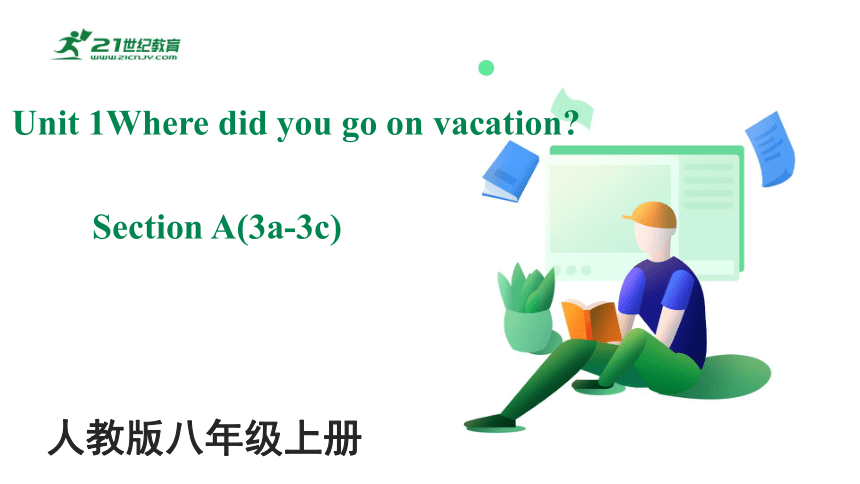 | |
| 格式 | zip | ||
| 文件大小 | 5.9MB | ||
| 资源类型 | 试卷 | ||
| 版本资源 | 人教新目标(Go for it)版 | ||
| 科目 | 英语 | ||
| 更新时间 | 2022-08-16 15:57:31 | ||
图片预览

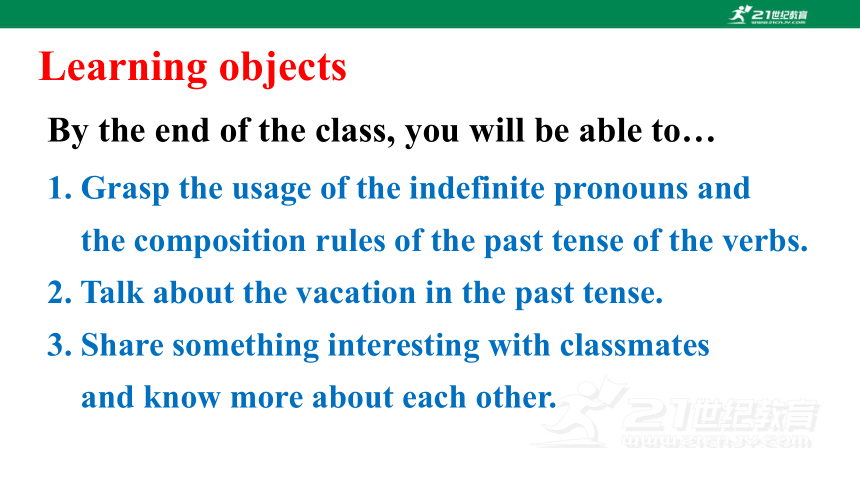
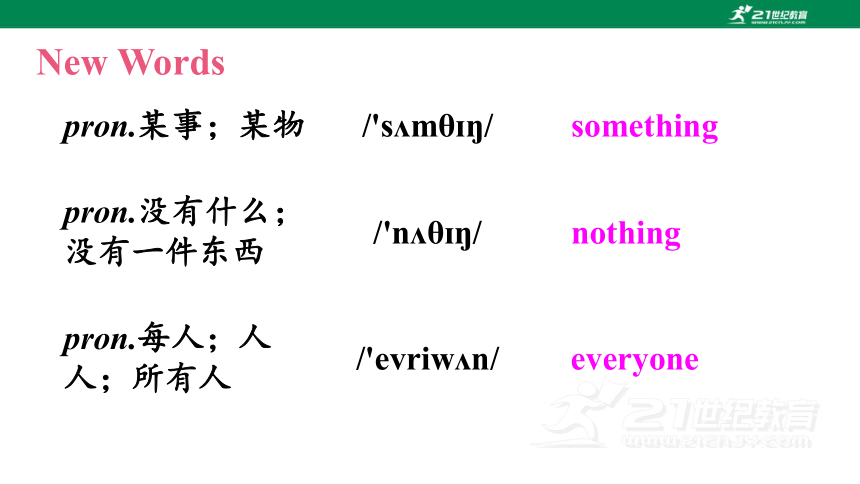
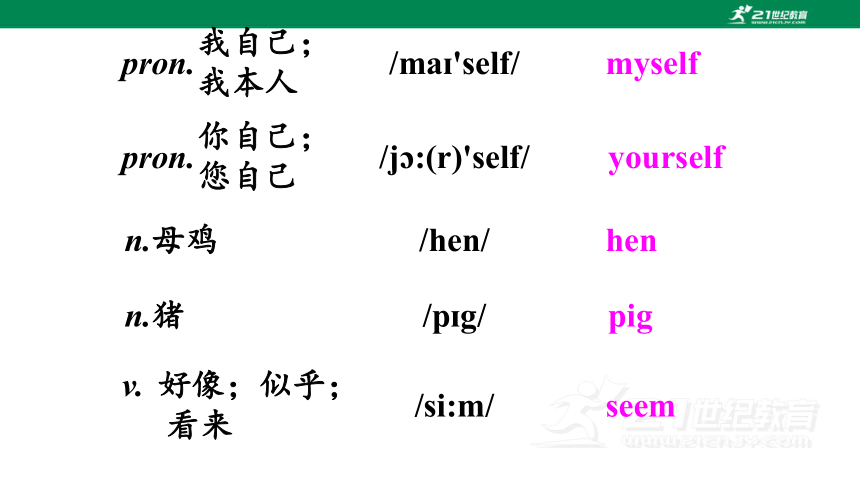
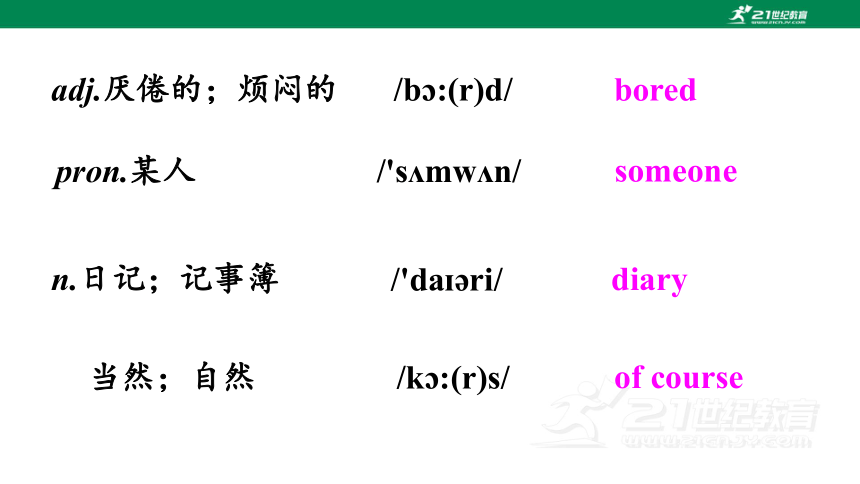
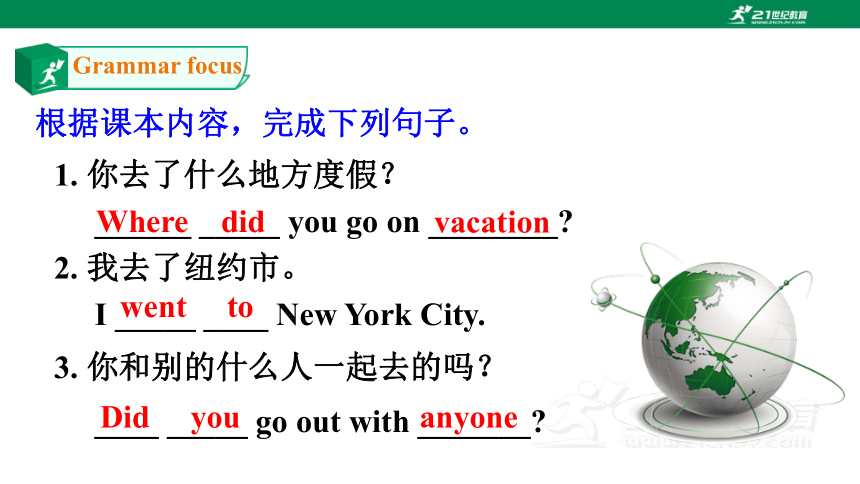
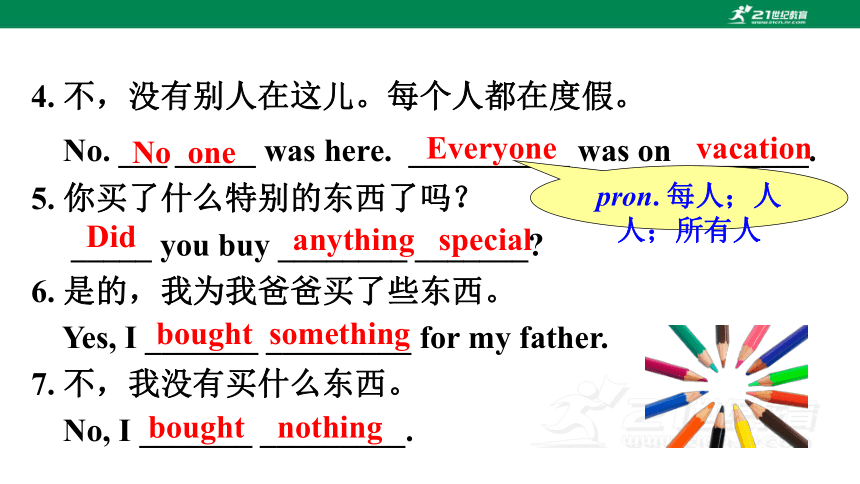
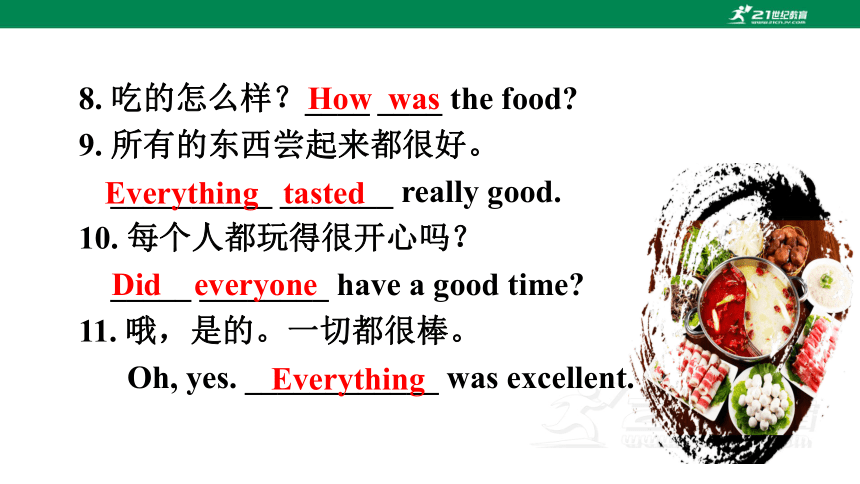
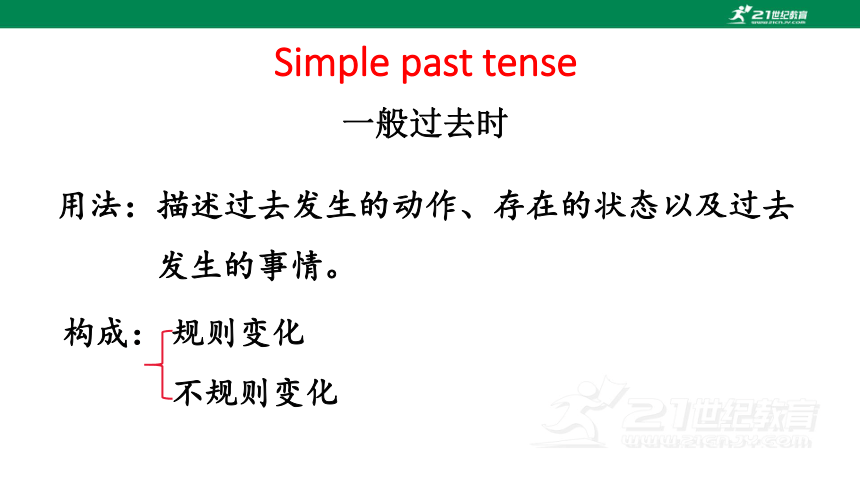
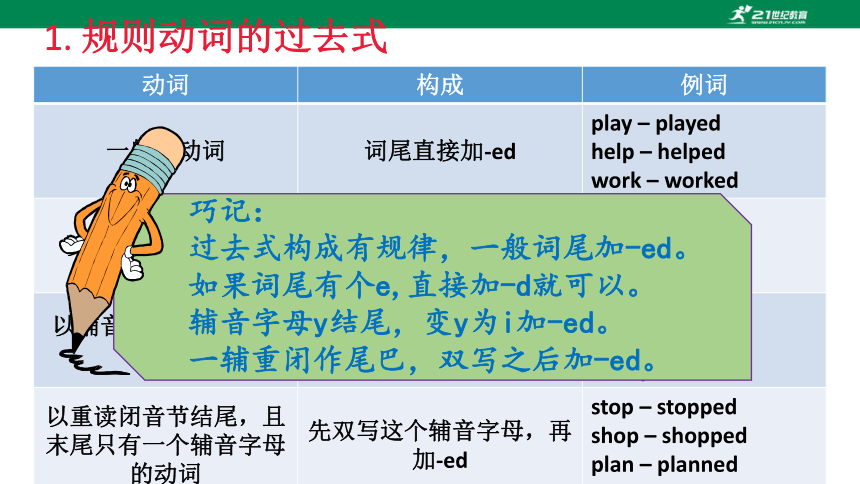
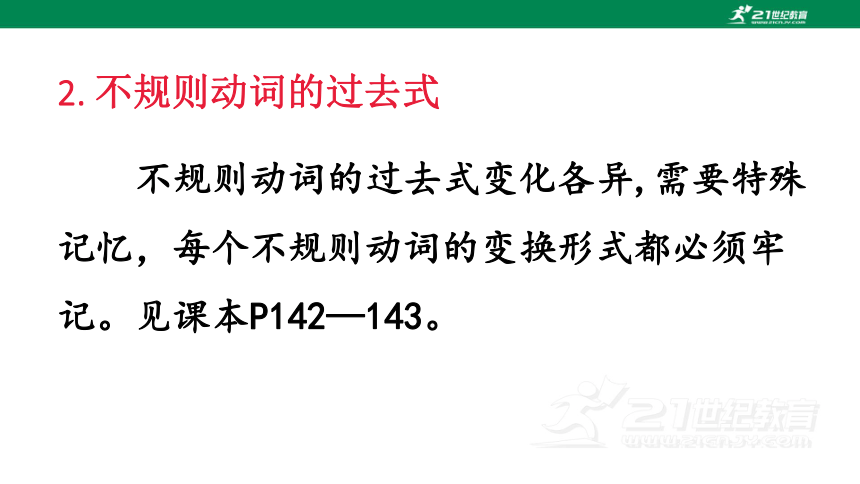
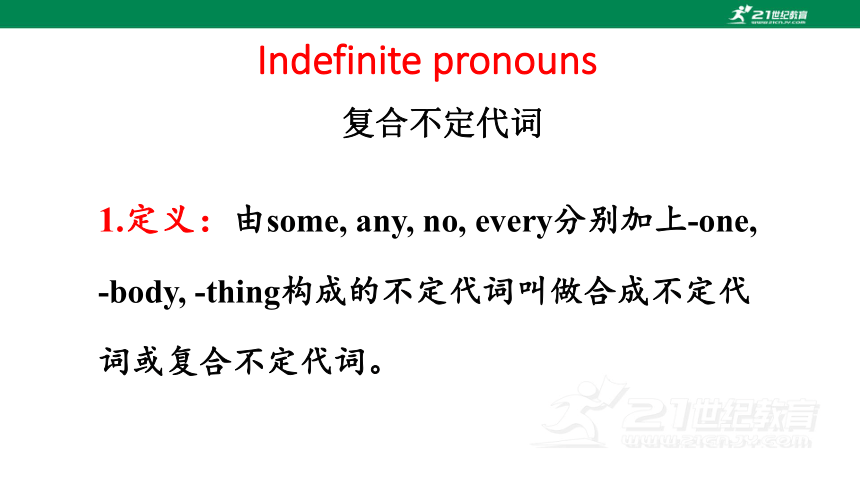
文档简介
(共39张PPT)
人教版八年级上册
Unit 1Where did you go on vacation
Section A(3a-3c)
Learning objects
By the end of the class, you will be able to…
1. Grasp the usage of the indefinite pronouns and
the composition rules of the past tense of the verbs.
2. Talk about the vacation in the past tense.
3. Share something interesting with classmates
and know more about each other.
New Words
pron.某事;某物
/'s mθ /
something
pron.没有什么;没有一件东西
/'n θ /
nothing
pron.每人;人人;所有人
/'evriw n/
everyone
seem
你自己;您自己
/j :(r)'self/
yourself
n.母鸡
/hen/
hen
pron.
n.猪
/p g/
pig
好像;似乎;
看来
/si:m/
v.
myself
我自己;
我本人
/ma 'self/
pron.
of course
adj.厌倦的;烦闷的
/b :(r)d/
bored
pron.某人
/'s mw n/
someone
n.日记;记事簿
/'da ri/
diary
当然;自然
/k :(r)s/
1. 你去了什么地方度假?
______ _____ you go on ________
2. 我去了纽约市。
I _____ ____ New York City.
3. 你和别的什么人一起去的吗?
____ _____ go out with _______
vacation
Where did
went to
根据课本内容,完成下列句子。
Grammar focus
Did you
anyone
4. 不,没有别人在这儿。每个人都在度假。
No. ___ _____ was here. __________ was on ________.
5. 你买了什么特别的东西了吗?
_____ you buy ________ _______
6. 是的,我为我爸爸买了些东西。
Yes, I _______ _________ for my father.
7. 不,我没有买什么东西。
No, I _______ _________.
anything special
Did
bought something
bought nothing
No one
Everyone
vacation
pron. 每人;人人;所有人
8. 吃的怎么样?____ ____ the food
9. 所有的东西尝起来都很好。
__________ _______ really good.
10. 每个人都玩得很开心吗?
_____ ________ have a good time
11. 哦,是的。一切都很棒。
Oh, yes. ____________ was excellent.
How was
Everything tasted
Did everyone
Everything
Simple past tense
一般过去时
用法:描述过去发生的动作、存在的状态以及过去
发生的事情。
构成: 规则变化
不规则变化
动词 构成 例词
一般的动词 词尾直接加-ed play – played
help – helped
work – worked
以字母e结尾的动词 词尾只加-d
like – liked
live – lived
arrive – arrived
以辅音字母加y结尾的动词 变y为i,再加-ed study – studied
cry – cried
worry – worried
以重读闭音节结尾,且末尾只有一个辅音字母的动词 先双写这个辅音字母,再加-ed stop – stopped
shop – shopped
plan – planned
1. 规则动词的过去式
巧记:
过去式构成有规律,一般词尾加-ed。
如果词尾有个e,直接加-d就可以。
辅音字母y结尾,变y为i加-ed。
一辅重闭作尾巴,双写之后加-ed。
不规则动词的过去式变化各异,需要特殊记忆,每个不规则动词的变换形式都必须牢记。见课本P142—143。
2. 不规则动词的过去式
Indefinite pronouns
复合不定代词
1.定义:由some, any, no, every分别加上-one, -body, -thing构成的不定代词叫做合成不定代词或复合不定代词。
2.常见的复合不定代词
one body thing
some someone somebody something
any anyone anybody anything
every everyone everybody everything
no no one nobody nothing
复合不定代词相当于名词,在句中可作主语、宾语或表语,但不能作定语。
3. 用法
例:Everybody here likes swimming.(作主语)
I have something to tell you.(作宾语)
There is someone in the room.(作表语)
例:今天的报纸上有什么重要新闻吗
Is there anything important in today’s newspaper
我今天无事可做。
I have nothing to do today.
你还想要其他东西吗
Do you want anything else
复合不定代词被形容词、不定式、else等修饰时应置于其后。
复合不定代词作主语时,谓语动词用单数形式。
例:一切都在变得越来越好。
Everything is getting better and better.
含有some的复合不定代词多用于肯定句中,也可用于表示邀请,请求或建议的疑问句中,表示说话者希望得到肯定的答复。
例:你想要吃点什么吗?
Would you like something to eat
含有any的复合不定代词多用于否定、疑问句和条件从句中,也可用于肯定句中,意为“任何人、事”。
例:任何人都能做这个。
Anyone can do this.
复合代词有特长,修饰成分放后边。
如果它来作主语,谓语单数没商量。
some- 代词肯定句,any- 代词否、疑忙。
若是希望得肯定,some- 代词不相让。
巧记复合不定代词的用法
3a
Fill in the blanks with the words in the box and practice the conversation.
方法指导:
首先,应通读对话,掌握短文大意;其次,回顾一下复合不定代词的用法。然后,仔细阅读每个句子,根据空格前后的词语进行推敲。比如,第一句话是一个一般疑问句,空格前有do一词,可知空格处应填anything一词,意为“做什么事情”。其他类似。
anyone, something, anything, everything, nothing
Linda: Did you do _________ fun on your vacation,
Alice
Alice: Yes, I did. I went to Sanya.
Linda: How did you like it
Alice: Well, it was my first time there, so __________
was really interesting.
anything
everything
Linda: Did you go with ________
Alice: Yes, I did. I went with my sister.
Linda: Did you go shopping
Alice: Of course! I bought _________
for my parents, but _________ for
myself.
anyone
anyone, something, anything, everything, nothing
something
nothing
pron. 我自己
当然;自然
Linda: Why didn’t you buy ________ for
yourself
Alice: I didn’t really see _________ I like.
anything
anything
anyone, something, anything, everything, nothing
pron. 你自己;您自己
anything, everything, nothing,
everyone, no one
Fill in the blanks in the e-mail message with the words in the box.
3b
Dear Bill,
How was your vacation Did you do ________ interesting Did _______ in the family go with you
anything
anyone
I went to a friend’s farm in the countryside with my family. __________ was great. We fed some hens and saw some baby pigs. They were so cute! The only problem was that there was _______ much to do in the evening but read. Still ______ seemed to be bored. Bye for now!
Mark
Everything
anything, everything, nothing, everyone, no one
nothing
no one
v. 好像;似乎;看来
adj. 厌倦的;烦闷的
myself (我自己) ,yourself (你自己)是反身代词。表示“某人自己的”词叫反身代词。
见下表:
myself yourself himself herself itself
我自己 你自己 他自己 她自己 它自己
ourselves yourselves themselves
我们自己 你们自己 他们自己
1) Did you buy anything for yourself
你为你自己买什么东西了吗 (做介词宾语)
2) The old man taught himself English.
那位老人自学英语。(做动词宾语)
3) The thing itself is not important.
事情本身并不重要。(做同位语)
4) I myself visited my aunt last weekend.
上周我自己去拜访了姑姑。(做同位语)
2. How did you like it
句型How ... sb. like ... 与What ... sb. think of ... 同义,意为“某人觉得……怎么样?”。如:
How do you like the TV show
= ____________________ the TV show
你觉得这个电视节目怎么样?
What do you think of
3. Still no one seemed to be bored.
seem意为“好像;似乎;看来”,其主要用法如下:
◆seem+ (to be) + adj. 如:
The movie ___________________________.
这部电影似乎很有趣。
◆seem to do sth. 如:
The boy ____________________ nothing about it.
这个男孩似乎对它一无所知。
seems (to be) interesting
seems to know
◆It seems that ... 如:
It seems that Mr. Zhang is at home.
张先生好像在家。
据汉语意思完成英语句子。
1) 这儿的衣服似乎很贵。
The clothes here ___________ very expensive.
2) 他们似乎周六要去上海。
They seem _______ to Shanghai on Saturday.
3) 好像今天她要开车去上班。
_____________ she’ll drive to work today.
seem to be
to go
It seems that
bored
boring与bored的用法区别
bored和boring是动词bore的两个形容词。bored表示 “感到厌烦的”,用来指人;boring表示“令人厌烦的 ”,用来指物。
翻译下列句子
这部电视剧很无聊。
2) 我很无聊。
The TV play is boring.
I am very bored.
Did you… Everyone Someone (name) No one
eat anything at a restaurant
read anything interesting
visit anyone in your family
buy anything
keep a diary
Ask your group questions about their last vacation. Then tell the class your results.
3c
n. 日记;记事薄
Summary
The composition rules of the regular and irregular verbs in the simple past tense.
The usage of indefinite pronouns.
1. I have ____ to tell you.
A. anything interesting B. something interesting
C. interesting anything D. interesting something
2. The light in the room still on, I think ____ is in the room.
A. everyone B. anyone C. someone
3. The work is very easy, I can do it by ____.
A. me B. my C. mine D. myself
4. The TV show is very ____, and I feel ____.
A. boring, bored B. boring, boring
C. bored, bored D. bored, boring
根据句意及所给汉语提示,写出所缺单词。
1. We didn't see any ______ (母鸡) on the farm.
2. There’re two _______ (猪). One is small and the other is big.
3. It _______ (好像) that Mike stayed up late last night.
4. After watching TV for a while, I felt _________ (烦闷的) and left.
5. I started keeping a(n) ________ (日记) when I was thirteen.
hens
pigs
seems
bored
diary
Homework
1. 背诵Grammar focus部分。
2. 复习复合不定代词及反身代词的用法。
谢谢
21世纪教育网(www.21cnjy.com)
中小学教育资源网站
兼职招聘:
https://www.21cnjy.com/recruitment/home/admin
人教版八年级上册
Unit 1Where did you go on vacation
Section A(3a-3c)
Learning objects
By the end of the class, you will be able to…
1. Grasp the usage of the indefinite pronouns and
the composition rules of the past tense of the verbs.
2. Talk about the vacation in the past tense.
3. Share something interesting with classmates
and know more about each other.
New Words
pron.某事;某物
/'s mθ /
something
pron.没有什么;没有一件东西
/'n θ /
nothing
pron.每人;人人;所有人
/'evriw n/
everyone
seem
你自己;您自己
/j :(r)'self/
yourself
n.母鸡
/hen/
hen
pron.
n.猪
/p g/
pig
好像;似乎;
看来
/si:m/
v.
myself
我自己;
我本人
/ma 'self/
pron.
of course
adj.厌倦的;烦闷的
/b :(r)d/
bored
pron.某人
/'s mw n/
someone
n.日记;记事簿
/'da ri/
diary
当然;自然
/k :(r)s/
1. 你去了什么地方度假?
______ _____ you go on ________
2. 我去了纽约市。
I _____ ____ New York City.
3. 你和别的什么人一起去的吗?
____ _____ go out with _______
vacation
Where did
went to
根据课本内容,完成下列句子。
Grammar focus
Did you
anyone
4. 不,没有别人在这儿。每个人都在度假。
No. ___ _____ was here. __________ was on ________.
5. 你买了什么特别的东西了吗?
_____ you buy ________ _______
6. 是的,我为我爸爸买了些东西。
Yes, I _______ _________ for my father.
7. 不,我没有买什么东西。
No, I _______ _________.
anything special
Did
bought something
bought nothing
No one
Everyone
vacation
pron. 每人;人人;所有人
8. 吃的怎么样?____ ____ the food
9. 所有的东西尝起来都很好。
__________ _______ really good.
10. 每个人都玩得很开心吗?
_____ ________ have a good time
11. 哦,是的。一切都很棒。
Oh, yes. ____________ was excellent.
How was
Everything tasted
Did everyone
Everything
Simple past tense
一般过去时
用法:描述过去发生的动作、存在的状态以及过去
发生的事情。
构成: 规则变化
不规则变化
动词 构成 例词
一般的动词 词尾直接加-ed play – played
help – helped
work – worked
以字母e结尾的动词 词尾只加-d
like – liked
live – lived
arrive – arrived
以辅音字母加y结尾的动词 变y为i,再加-ed study – studied
cry – cried
worry – worried
以重读闭音节结尾,且末尾只有一个辅音字母的动词 先双写这个辅音字母,再加-ed stop – stopped
shop – shopped
plan – planned
1. 规则动词的过去式
巧记:
过去式构成有规律,一般词尾加-ed。
如果词尾有个e,直接加-d就可以。
辅音字母y结尾,变y为i加-ed。
一辅重闭作尾巴,双写之后加-ed。
不规则动词的过去式变化各异,需要特殊记忆,每个不规则动词的变换形式都必须牢记。见课本P142—143。
2. 不规则动词的过去式
Indefinite pronouns
复合不定代词
1.定义:由some, any, no, every分别加上-one, -body, -thing构成的不定代词叫做合成不定代词或复合不定代词。
2.常见的复合不定代词
one body thing
some someone somebody something
any anyone anybody anything
every everyone everybody everything
no no one nobody nothing
复合不定代词相当于名词,在句中可作主语、宾语或表语,但不能作定语。
3. 用法
例:Everybody here likes swimming.(作主语)
I have something to tell you.(作宾语)
There is someone in the room.(作表语)
例:今天的报纸上有什么重要新闻吗
Is there anything important in today’s newspaper
我今天无事可做。
I have nothing to do today.
你还想要其他东西吗
Do you want anything else
复合不定代词被形容词、不定式、else等修饰时应置于其后。
复合不定代词作主语时,谓语动词用单数形式。
例:一切都在变得越来越好。
Everything is getting better and better.
含有some的复合不定代词多用于肯定句中,也可用于表示邀请,请求或建议的疑问句中,表示说话者希望得到肯定的答复。
例:你想要吃点什么吗?
Would you like something to eat
含有any的复合不定代词多用于否定、疑问句和条件从句中,也可用于肯定句中,意为“任何人、事”。
例:任何人都能做这个。
Anyone can do this.
复合代词有特长,修饰成分放后边。
如果它来作主语,谓语单数没商量。
some- 代词肯定句,any- 代词否、疑忙。
若是希望得肯定,some- 代词不相让。
巧记复合不定代词的用法
3a
Fill in the blanks with the words in the box and practice the conversation.
方法指导:
首先,应通读对话,掌握短文大意;其次,回顾一下复合不定代词的用法。然后,仔细阅读每个句子,根据空格前后的词语进行推敲。比如,第一句话是一个一般疑问句,空格前有do一词,可知空格处应填anything一词,意为“做什么事情”。其他类似。
anyone, something, anything, everything, nothing
Linda: Did you do _________ fun on your vacation,
Alice
Alice: Yes, I did. I went to Sanya.
Linda: How did you like it
Alice: Well, it was my first time there, so __________
was really interesting.
anything
everything
Linda: Did you go with ________
Alice: Yes, I did. I went with my sister.
Linda: Did you go shopping
Alice: Of course! I bought _________
for my parents, but _________ for
myself.
anyone
anyone, something, anything, everything, nothing
something
nothing
pron. 我自己
当然;自然
Linda: Why didn’t you buy ________ for
yourself
Alice: I didn’t really see _________ I like.
anything
anything
anyone, something, anything, everything, nothing
pron. 你自己;您自己
anything, everything, nothing,
everyone, no one
Fill in the blanks in the e-mail message with the words in the box.
3b
Dear Bill,
How was your vacation Did you do ________ interesting Did _______ in the family go with you
anything
anyone
I went to a friend’s farm in the countryside with my family. __________ was great. We fed some hens and saw some baby pigs. They were so cute! The only problem was that there was _______ much to do in the evening but read. Still ______ seemed to be bored. Bye for now!
Mark
Everything
anything, everything, nothing, everyone, no one
nothing
no one
v. 好像;似乎;看来
adj. 厌倦的;烦闷的
myself (我自己) ,yourself (你自己)是反身代词。表示“某人自己的”词叫反身代词。
见下表:
myself yourself himself herself itself
我自己 你自己 他自己 她自己 它自己
ourselves yourselves themselves
我们自己 你们自己 他们自己
1) Did you buy anything for yourself
你为你自己买什么东西了吗 (做介词宾语)
2) The old man taught himself English.
那位老人自学英语。(做动词宾语)
3) The thing itself is not important.
事情本身并不重要。(做同位语)
4) I myself visited my aunt last weekend.
上周我自己去拜访了姑姑。(做同位语)
2. How did you like it
句型How ... sb. like ... 与What ... sb. think of ... 同义,意为“某人觉得……怎么样?”。如:
How do you like the TV show
= ____________________ the TV show
你觉得这个电视节目怎么样?
What do you think of
3. Still no one seemed to be bored.
seem意为“好像;似乎;看来”,其主要用法如下:
◆seem+ (to be) + adj. 如:
The movie ___________________________.
这部电影似乎很有趣。
◆seem to do sth. 如:
The boy ____________________ nothing about it.
这个男孩似乎对它一无所知。
seems (to be) interesting
seems to know
◆It seems that ... 如:
It seems that Mr. Zhang is at home.
张先生好像在家。
据汉语意思完成英语句子。
1) 这儿的衣服似乎很贵。
The clothes here ___________ very expensive.
2) 他们似乎周六要去上海。
They seem _______ to Shanghai on Saturday.
3) 好像今天她要开车去上班。
_____________ she’ll drive to work today.
seem to be
to go
It seems that
bored
boring与bored的用法区别
bored和boring是动词bore的两个形容词。bored表示 “感到厌烦的”,用来指人;boring表示“令人厌烦的 ”,用来指物。
翻译下列句子
这部电视剧很无聊。
2) 我很无聊。
The TV play is boring.
I am very bored.
Did you… Everyone Someone (name) No one
eat anything at a restaurant
read anything interesting
visit anyone in your family
buy anything
keep a diary
Ask your group questions about their last vacation. Then tell the class your results.
3c
n. 日记;记事薄
Summary
The composition rules of the regular and irregular verbs in the simple past tense.
The usage of indefinite pronouns.
1. I have ____ to tell you.
A. anything interesting B. something interesting
C. interesting anything D. interesting something
2. The light in the room still on, I think ____ is in the room.
A. everyone B. anyone C. someone
3. The work is very easy, I can do it by ____.
A. me B. my C. mine D. myself
4. The TV show is very ____, and I feel ____.
A. boring, bored B. boring, boring
C. bored, bored D. bored, boring
根据句意及所给汉语提示,写出所缺单词。
1. We didn't see any ______ (母鸡) on the farm.
2. There’re two _______ (猪). One is small and the other is big.
3. It _______ (好像) that Mike stayed up late last night.
4. After watching TV for a while, I felt _________ (烦闷的) and left.
5. I started keeping a(n) ________ (日记) when I was thirteen.
hens
pigs
seems
bored
diary
Homework
1. 背诵Grammar focus部分。
2. 复习复合不定代词及反身代词的用法。
谢谢
21世纪教育网(www.21cnjy.com)
中小学教育资源网站
兼职招聘:
https://www.21cnjy.com/recruitment/home/admin
同课章节目录
- Unit 1 Where did you go on vacation?
- Section A
- Section B
- Unit 2 How often do you exercise?
- Section A
- Section B
- Unit 3 I'm more outgoing than my sister.
- Section A
- Section B
- Unit 4 What's the best movie theater?
- Section A
- Section B
- Unit 5 Do you want to watch a game show?
- Section A
- Section B
- Unit 6 I'm going to study computer science.
- Section A
- Section B
- Unit 7 Will people have robots?
- Section A
- Section B
- Unit 8 How do you make a banana milk shake?
- Section A
- Section B
- Unit 9 Can you come to my party?
- Section A
- Section B
- Unit 10 If you go to the party, you'll have a grea
- Section A
- Section B
